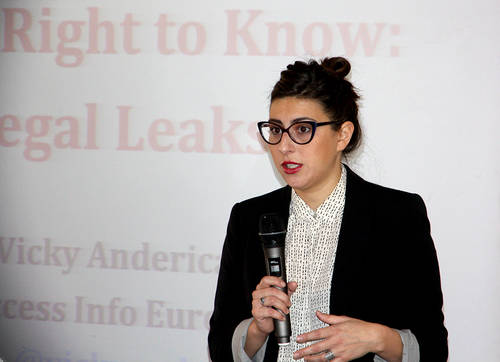This article was originally published by UNESCO.
What are the grants received from the European Union (EU) in Turkey? Who are the beneficiaries? How were they decided? And, who lobbied in those decisions? Accessing this type of information can be a source of interesting and original stories for journalists. European Union institutions have information about each and every country, not only on EU member states.
To help media professionals access information held by public bodies at the EU level as well as in Turkey and other countries, a Legal Leaks training seminar was organized by UNESCO in cooperation with Access Info Europe, P24 and the SEENPM. The event took place in Ankara on 10 and 11 April 2015 and was attended by 30 participants.
“This training seminar is designed to empower journalists to use the right of access to information in order to hold public authorities to account and to produce stories of public interest” said Victoria Anderica, campaigner and researcher at Access Info Europe.
The training opened with a roundtable discussion on 10 April 2015 on the topic of access to information and media accountability. Participating in the debate were national experts and media professionals: Faruk Bildirici, Yavuz Baydar, Sezin Öney and Ciğdem Toker and international freedom of information (FOI) experts: Staffan Dallhöf and Gavin Sheridan.
On 11 April 2015, Victoria Anderica gave an introduction on the right of access to information and presented the Legal Leaks Toolkit on how to obtain information from public bodies and how to appeal refusals. Each participant received a copy of the Toolkit, which is designed for journalists working in newspapers, radio and television, as well as bloggers. The Turkish language version includes specific guidance on the national legal framework in Turkey. The Toolkits can be found online at this address: http://www.legalleaks.info/toolkit.html.
Gavin Sheridan, an expert on access to information in Ireland and across the EU, followed with a session explaining how to systematically integrate FOI requests into journalistic research. He gave different examples of how he successfully used laws from countries besides Ireland to write stories about his own country. He explained how new technologies and databases can be used to extract and report on information obtained through FOI requests, highlighting that “there are enormous opportunities for business in journalism in the digital space. When using FOI laws, you can build a system to get stories all the time.”
Staffan Dahllöf explained the way that EU institutions function and how to request information at the EU level. He clarified the differences between the EU Commission, the Parliament, and the Council, and presented various websites and tools where information can be accessed, in particular the Asktheeu.org request platform run by Access Info.
Adeline Hulin from UNESCO concluded the training by saying: “using access to information laws can invigorate and strengthen journalism, thereby contributing to higher quality public debates, increased public participation in decision-making, and thus to more open and democratic societies.”
This event took place within the framework of the EU/UNESCO project “Media Accountability in South East Europe” which started in January 2013. This was the final training in a series of local events that took place under the project, the others being in Tirana, Sarajevo, Pristina, Podgorica and Belgrade, with a regional event held in Skopje, the Former Yugoslav Republic of Macedonia in October 2014.

